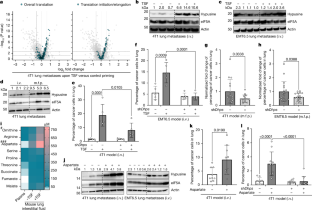Aspartate signalling drives lung metastasis via alternative translation
IF 48.5
1区 综合性期刊
Q1 MULTIDISCIPLINARY SCIENCES
引用次数: 0
Abstract
Lung metastases occur in up to 54% of patients with metastatic tumours1,2. Contributing factors to this high frequency include the physical properties of the pulmonary system and a less oxidative environment that may favour the survival of cancer cells3. Moreover, secreted factors from primary tumours alter immune cells and the extracellular matrix of the lung, creating a permissive pre-metastatic environment primed for the arriving cancer cells4,5. Nutrients are also primed during pre-metastatic niche formation6. Yet, whether and how nutrients available in organs in which tumours metastasize confer cancer cells with aggressive traits is mostly undefined. Here we found that pulmonary aspartate triggers a cellular signalling cascade in disseminated cancer cells, resulting in a translational programme that boosts aggressiveness of lung metastases. Specifically, we observe that patients and mice with breast cancer have high concentrations of aspartate in their lung interstitial fluid. This extracellular aspartate activates the ionotropic N-methyl-d-aspartate receptor in cancer cells, which promotes CREB-dependent expression of deoxyhypusine hydroxylase (DOHH). DOHH is essential for hypusination, a post-translational modification that is required for the activity of the non-classical translation initiation factor eIF5A. In turn, a translational programme with TGFβ signalling as a central hub promotes collagen synthesis in lung-disseminated breast cancer cells. We detected key proteins of this mechanism in lung metastases from patients with breast cancer. In summary, we found that aspartate, a classical biosynthesis metabolite, functions in the lung environment as an extracellular signalling molecule to promote aggressiveness of metastases. Aspartate in the tumour environment activates the N-methyl-d-aspartate receptor in cancer cells to induce cellular programmes that increase the aggressiveness of metastasis.


天冬氨酸信号通过替代翻译驱动肺转移
高达54%的转移性肿瘤患者发生肺转移1,2。造成这种高频率的因素包括肺系统的物理特性和较少氧化的环境,这可能有利于癌细胞的存活。此外,原发肿瘤分泌的因子会改变免疫细胞和肺细胞外基质,为到达的癌细胞创造一个允许的转移前环境4,5。在转移前生态位形成过程中,营养物质也被注入。然而,肿瘤转移器官中可用的营养物质是否以及如何赋予癌细胞具有侵袭性的特性仍未明确。在这里,我们发现肺天冬氨酸在播散性癌细胞中触发细胞信号级联,导致一个促进肺转移侵袭性的翻译程序。具体来说,我们观察到患有乳腺癌的患者和小鼠的肺间质液中有高浓度的天冬氨酸。这种细胞外的天冬氨酸激活癌细胞中的嗜离子性n -甲基-d-天冬氨酸受体,从而促进creb依赖性脱氧hypusine羟化酶(DOHH)的表达。DOHH对于假设是必不可少的,假设是翻译后修饰,是非经典翻译起始因子eIF5A活性所必需的。反过来,以tgf - β信号传导为中心枢纽的翻译程序促进肺弥散性乳腺癌细胞中的胶原合成。我们在乳腺癌患者的肺转移中检测到了这一机制的关键蛋白。总之,我们发现天冬氨酸作为一种经典的生物合成代谢物,在肺环境中作为细胞外信号分子发挥作用,促进转移的侵袭性。
本文章由计算机程序翻译,如有差异,请以英文原文为准。
求助全文
约1分钟内获得全文
求助全文
来源期刊

Nature
综合性期刊-综合性期刊
CiteScore
90.00
自引率
1.20%
发文量
3652
审稿时长
3 months
期刊介绍:
Nature is a prestigious international journal that publishes peer-reviewed research in various scientific and technological fields. The selection of articles is based on criteria such as originality, importance, interdisciplinary relevance, timeliness, accessibility, elegance, and surprising conclusions. In addition to showcasing significant scientific advances, Nature delivers rapid, authoritative, insightful news, and interpretation of current and upcoming trends impacting science, scientists, and the broader public. The journal serves a dual purpose: firstly, to promptly share noteworthy scientific advances and foster discussions among scientists, and secondly, to ensure the swift dissemination of scientific results globally, emphasizing their significance for knowledge, culture, and daily life.
 求助内容:
求助内容: 应助结果提醒方式:
应助结果提醒方式:


